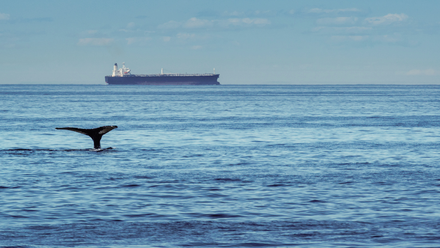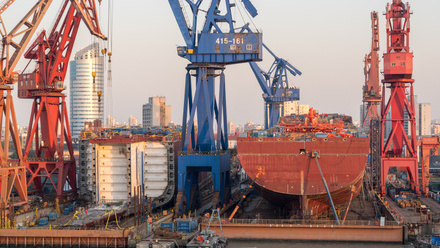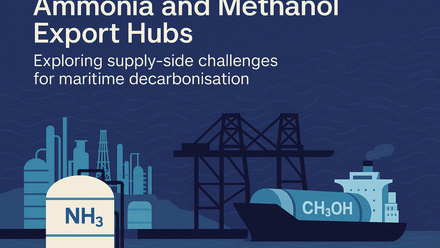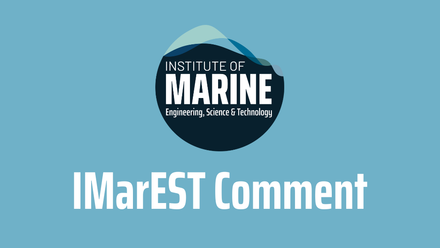Decarbonisation and skills shortages in focus
Five areas the Institute will be exploring in great detail as we head into 2026.
As the final Interactions of the year, we sit down with Alasdair Wishart – IMarEST’s Technical and Policy Director – and cast our gaze on five areas IMarEST will focus on in 2026.
“This is a snippet of focus for 2026, but as we empower our members and grow our technical voice, we can and will do more,” says Wishart.
1/ Effective rollout of IMarEST's new three-year strategy
When Wishart joined IMarEST in August 2025, one of the first items on his agenda was to support the development of a new three-year strategy.
Looking forward to 2028, the strategy calls for a “Renewed focus on our international marine community – finally answering the question of 'What’s in it for me?' from the members’ perspective,” says Wishart.
Linked to this will be the creation of a revised technical plan focused on bringing the SIGs (Special Interest Groups), branches, and members together in a more cohesive way, “to amplify our technical voice and make IMarEST more impactful.” IMarEST will also enhance its global reach while strengthening local engagement.
“IMarEST needs to move away from being seen as a UK-centric, old-school network of professionals,” explains Wishart. “We have over 12,500 members in over 120 different locations. We will better leverage this global presence to become a more effective Institute.”
2/ Decarbonisation and meeting net zero by 2050
The IMO’s net zero regulations for global shipping are expected to enter into force in 2027. IMarEST has been – and will continue to be – actively engaged with the IMO to develop and refine the guidelines and strategy objectives.
Among the strategic recommendations from IMarEST are to clarify ‘zero’ and ‘near zero’ fuels as e-fuels, develop a cost-effective, just, and equitable reward mechanism, and develop robust life cycle assessment guidelines, sustainability criteria, and certification procedures.
3/ Facing the workforce and skills shortages
“By 2026, the [maritime] industry is expected to face a shortfall of nearly 90,000 trained professionals, not to mention the existing 9% officer shortage within global crewing pools,” Wishart explains. In recent years, IMarEST has launched several resources to support young and future maritime professionals to help reduce this gap.
The Sea Your Future network introduces young people to the possibilities of a career in the marine sector, while the M2M (member-to-member) mentoring programme is designed to bridge generations through collaboration. The upcoming learning management system will offer on-demand courses, technical modules, and soft skills training to support lifelong learning and professional development.
“We are also engaged with the Human Element Industry Group (HEIG), who are currently working on defining ‘human centred design’ to legislate against poorly designed systems which cause incidents,” says Wishart.
4/ Digitalisation and AI
IMarEST will continue to play a role in shaping the finalisation of the IMO MASS (Maritime Autonomous Surface Ships) code, expected in May 2026. As a participant in the MSC (Maritime Safety committee) ISWG (Intersessional Working Group) MASS, IMarEST is focusing on ensuring the level of technological operational readiness is matched with equally rigorous and fit-for-purpose training frameworks.
Additionally, IMarEST will consider tools which can measure and provide feedback on the MASS code effectiveness and how to ensure the voluntary code is fit for purpose. “AI analysis of MASS data can play a key role in facilitating policy analysis and driving improvement,” says Wishart.
5/ UN High Seas Treaty
In January 2026, the UN High Seas Treaty will enter into force. Designed to improve the conservation and sustainable and equitable use of marine biological diversity in the high seas, “Inevitably, the treaty will have implications for the maritime sector,” Wishart states.
Following ratification, the first Conference of the Parties (COP) to the BBNJ (Agreement on Marine Biological Diversity of Areas Beyond National Jurisdiction) will convene in late 2026, at which time a scientific and technical advisory body will be established. “IMarEST stands ready to contribute to this process through our ongoing work in international consultations and our representation at the IMO,” explains Wishart.
Wishart also highlights that IMarEST is a UN Ocean Decade implementing partner: “We currently have around 20 endorsed Ocean Decade actions, and our Ocean Decade Ambassador, Niru Dorrian, remains at the forefront of this drive.”
Tell us what you think about this article by joining the discussion on IMarEST Connect.
Image: drone view of ocean surf and waves hitting shoreline. Credit: Shutterstock.






